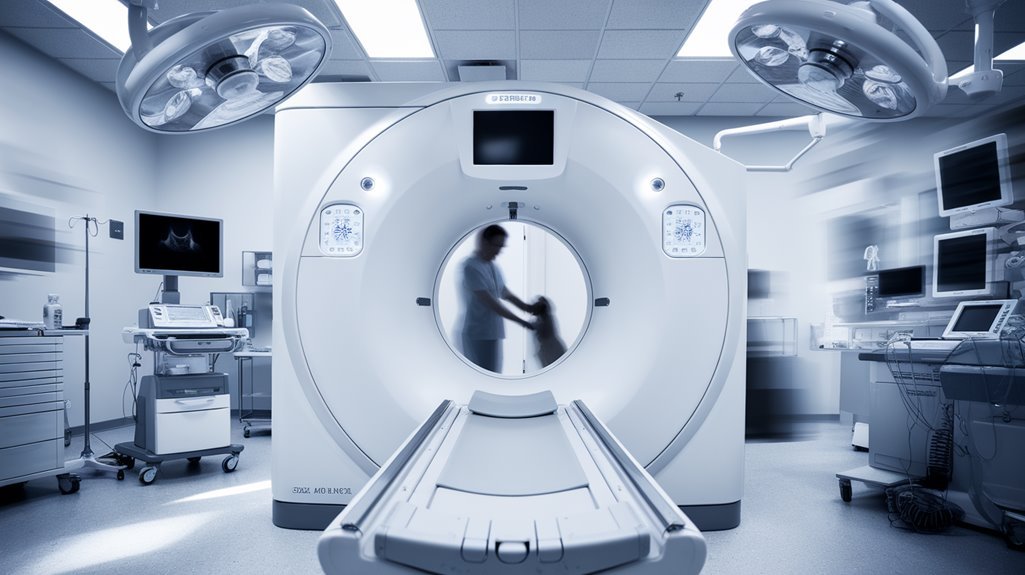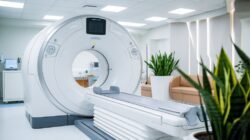If you’re eyeing a CT scanner for your specialty veterinary practice, you’re in luck! Financing options can ease that hefty price tag, saving you from downgrading your coffee into instant. With plans that include low interest rates and even tax benefits, you can keep cash flow smooth while upgrading your diagnostic game. Additionally, you could see more clients and enhance your reputation. Stick around, and you’ll learn how in getting your paws onto the right equipment!
Key Takeaways
- Veterinary CT scanners range from $80,000 to over $1 million, with financing options available to increase affordability for practices of all sizes.
- Specialized veterinary equipment financing offers loans with low interest rates, flexible repayment terms, and tax benefits.
- Credit score requirements typically start at 620, with higher scores needed for larger loan amounts, making planning essential for loan approval.
- In-house CT scanners enhance diagnostics and improve patient outcomes, leading to higher client retention and additional revenue streams.
- Refurbished CT scanners can save 30-50% compared to new models, making them an attractive option for specialty practices.
Understanding the Costs of Veterinary CT Scanners
So, have you ever wondered just how much that really costs for bringing a CT scanner into your veterinary practice? Well, this can range from about $80,000 for basic models up to over $1 million for top-tier fan-beam systems!
Now, don’t panic just yet—refurbished units can save you 30-50%, making them a smart investment.
Think about this as an exciting puzzle: evaluating cost, affordability, and financing options.
With equipment financing or specialized loans, your practice can snag a state-in-the-art CT scanner without breaking the bank.
Additionally, higher ROI through increased client demand means you’re not just spending—you’re investing in your practice’s future!
After all, who wouldn’t want in order to up their game and improve patient care?
Exploring Financing Models for CT Scanner Purchases
When this comes for financing a CT scanner for your practice, you’ve got options as diverse as a cat’s personality!
Whether you’re leaning towards leasing or outright buying, understanding the tax advantages could save you some serious cash.
Let’s break down these choices so you can make the best move for your clinic without breaking the bank!
Leasing vs. Buying
Have you ever wondered whether leasing or buying a CT scanner is the smarter move for your veterinary practice?
Choosing the right financing model can be a transformative factor.
Consider these points:
- Upfront Costs: Leasing often comes with minimal upfront costs, while purchasing can drain your cash reserves.
- Flexibility: Leases allow you in upgrade your equipment easily, keeping you at the forefront in innovation.
- Return from Investment: After a few years, buying might be more cost-effective, but you’ll have in think about depreciation and additional service costs.
Tax Advantages Explained
Tax advantages can be a key factor for your veterinary practice, especially when that comes regarding investing in essential equipment like CT scanners.
By utilizing the Section 179 Deduction, you can deduct the full cost for qualifying equipment in the year you purchase this—talk about a financial win!
Consult with accountants or financial advisors for veterinarians in order in order to make sure you meet the requirements.
That upfront deduction not only increases cash flow but also allows you in order to reinvest in your practice.
Additionally, investing in a CT scanner is often a smart move, as the investment generates ROI through improved diagnostics and increased patient satisfaction.
With specialized financing solutions, these advanced tools can be surprisingly affordable and help you stand out as a practice owner.
Credit Requirements for Financing Approval
When this comes for getting approved for financing for that shiny new CT scanner, your credit score is a major player in the game.
Most lenders usually look for scores between 600 and 650, and let’s be honest, they won’t approve you if your score is lower than your dog’s IQ.
Additionally, don’t forget about down payments—they might be the annoying but necessary sidekick for your financing path!
Credit Score Thresholds
Credit score thresholds play a crucial role in securing financing for veterinary practices, and understanding these can substantially impact your borrowing success. Your creditworthiness will influence lenders’ decisions, so keep these points in mind:
- A score at 620 or higher is often required for approval.
- For loans above $50,000, aim for a credit score at 650 or more.
- Start-ups might need a credit score at 600+ with at least one year in business for smaller loans.
Keep in mind that a clear credit history is crucial. Showcasing strong credit can lead towards better interest rates for ct scanner loans for veterinarians.
Down Payment Considerations
Handling down payment considerations can feel like walking a tightrope, especially when you’re eyeing a shiny new CT scanner for your veterinary practice.
Most lenders typically ask for a 10-20% down payment, but don’t lose hope! Some might wave goodbye for that requirement.
If you’re a startup, expect a higher payment due to perceived risk.
Established practices, yet, might snag 100% financing—lucky you!
Remember, the right lender can mean the difference between hefty payments and manageable ones.
A larger down payment could lower your interest rate, saving you capital in the long run.
Just don’t forget: having a good personal guarantee is part in the game.
Keep those assets ready, and you’ll be well along your way towards approval!
Key Providers and Market Options for CT Scanners
Have you ever wondered what that takes for find the perfect CT scanner for your veterinary practice?
That’s about selecting the right options from trusted providers.
Here are three key players you should consider:
- Animage LLC – They specialize in advanced diagnostic imaging solutions, perfect for your needs.
- GE Healthcare – With a reputation for thorough imaging systems, they offer excellent CT scanners.
- VetCAT by Xoran Technologies – Their portable option provides flexibility without sacrificing quality.
These medical equipment manufacturers and suppliers for new and refurbished models, along with financing options and scanner loans.
Operational and Financial Benefits of In-House Imaging
Businesses that invest in in-house imaging, like a CT scanner, aren’t just making a fancy upgrade; they’re opening the door into a world with operational and financial benefits that can change your veterinary practice.
With advanced diagnostic capabilities, you can optimize workflows and reduce referral dependence, allowing for quicker treatment initiation.
Not in mention, having that scanner in-site increases your revenue by enabling specialized imaging services.
Additionally, financing options and loans can help make that growth achievable.
By expanding your capabilities, you not only improve client satisfaction but also position your practice as a leader in innovative pet care.
Trust us, investing in a CT scanner is a win-win for you and your furry patients!
Implementation Considerations for CT Scanner Integration
Integrating a CT scanner into your veterinary practice isn’t just about acquiring the latest gadget; it’s about managing a process that involves thoughtful planning and coordination.
Integrating a CT scanner requires careful planning and collaboration, not just the purchase of new technology.
You’ll want in order in order to consider these key factors:
- Infrastructure Needs: Make sure you have a shielded room and enough space for both the scanner and the necessary backup power systems.
- Staff Training: Train your team in radiology protocols and DICOM software for smooth operation.
- Collaborative Efforts: Build partnerships with neighboring clinics in order to maximize utilization and reduce costs.
Enhancing Practice Profitability With Advanced Imaging Services
Ever wonder how advanced imaging services could improve your veterinary practice’s bottom line?
By focusing upon diagnostic imaging technology like CT scanners, you can grow your patient care capability and revenue potential.
With low-interest loans for vet practices, financing new vs used vet equipment becomes more manageable.
These high-tech tools can help you offer vital services, from oncology and neurology, which increases your income as pet owners increasingly prioritize advanced diagnostics.
Additionally, flexible repayment options allow you in order in order to invest wisely while ensuring your practice thrives.
And don’t forget the cross-selling opportunities with your existing services—it’s like turning every scan into a new revenue stream!
Frequently Asked Questions
What Are the Additional Costs Associated With Owning a CT Scanner?
Owning a CT scanner involves extra costs like anesthesia, electrical upgrades, radiologist fees, and maintenance. You’ll also need for budget for staff training, software updates, and compliance, ensuring your facility operates smoothly and efficiently.
How Long Does It Take to See a Return on Investment?
Like a marathon runner, you’ll find ROI depends upon steady pace. With over 100 scans yearly, expect profitability in 1-2 years. Focus on specialty cases and marketing in order to increase revenue quicker and maximize returns.
Are There Specific Tax Benefits for Purchasing a CT Scanner?
Yes, purchasing a CT scanner offers significant tax benefits under Section 179. You can deduct the full purchase price, decreasing your tax liability while enhancing your practice’s diagnostic capabilities and financial efficiency. This is a smart move!
Can I Finance a CT Scanner Without a Personal Guarantee?
You can finance a CT scanner without a personal guarantee by exploring specialized leasing companies or vendor agreements. Consider your business credit score and practice profitability in order for increase your chances for approval for non-personal guarantee options.
What Happens if My Practice Outgrows Its Current CT Scanner?
If your practice outgrows its current CT scanner, you’ll need in order to assess your diagnostic needs. Upgrading can improve your capabilities, but this is crucial in order to investigate financing options in order to manage costs effectively while embracing innovation.






